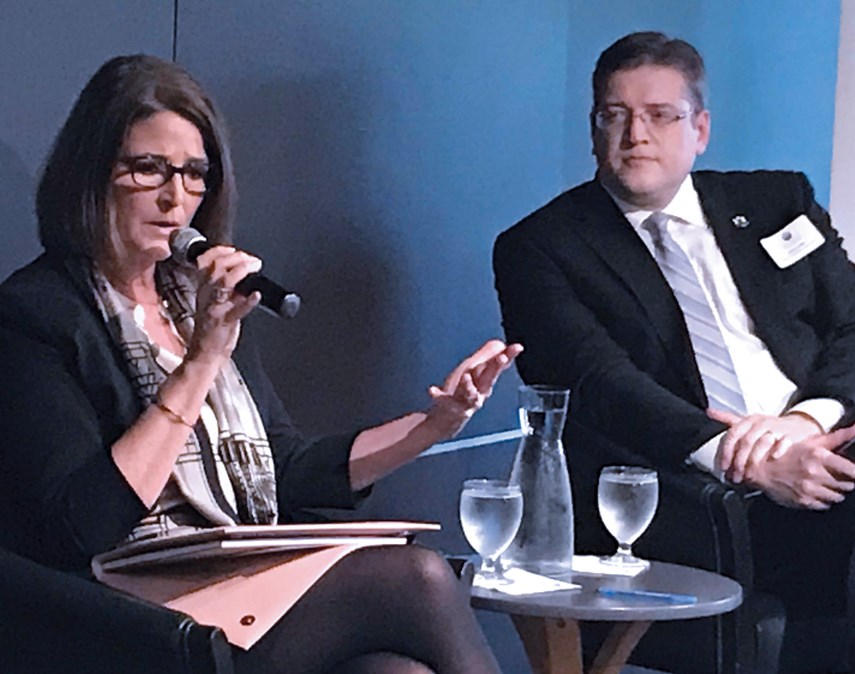Perennial issues of increasing affordable housing and getting better transportation options for the North Shore dominated a lunchtime discussion with North Vancouver’s two mayors Wednesday.
District of North Vancouver Mayor Mike Little and City of North Vancouver Mayor Linda Buchanan were in the hot seat at the annual North Vancouver Chamber event at the Seymour Golf and Country Club.
Traffic congestion remained a key topic with one questioner asking if the North Shore stands a chance of getting any of the rapid transit projects on its wish list in the next five years.
Little said that with roughly eight per cent of Metro’s population, the North Shore should be getting eight per cent of its transit budget spent on local projects. But the reality is far less of that money has been coming across Burrard Inlet, he acknowledged.
Buchanan said local politicians are continuing to advocate for funding. “It is well recognized from our colleagues at the table that the North Shore is overdue,” she said.
Transportation woes – particularly for workers commuting in from across the Metro region – were also tied to a continuing lack of affordable housing on the North Shore. Most businesses are having a hard time getting staff, because those people can’t afford to live here, said moderator Chris Catliff, CEO of BlueShore Financial. His own business added 26 new staff members this year but “we can’t get them housed over here,” he said. “It’s a really big issue to get that housing done.”
Little defended his own council’s approach, which has slowed the pace of development to a crawl.
“A lot of the redevelopment that has happened over the last 10 years was replacing housing that was already affordable,” he said, and substituting towers that sell for much higher prices.
Council is now focused on creating “genuinely affordable housing in our community,” he said – adding it’s not fair to lump a firefighter making over $100,000 a year into the same category as a retail clerk or barista making minimum wage when considering housing needs.
Buchanan pointed to her council’s approval of more than 300 new housing units this year, plus the introduction of a policy requiring that any displaced tenants be helped to relocate within the community.
She added the North Shore will be judged by how many young people who leave for post-secondary education ultimately return to live here.
“We cannot be a community of older people,” she said. “It just doesn’t work.”
The stress of increasing taxes caused by rising property assessments was another hot topic for businesses – most of whom must pay their landlord’s taxes under a “triple net” lease arrangement.
“Businesses need help right now,” said Catliff, reading a question aloud to the mayors. “What are you doing to release the stress of property taxes?”
But Buchanan warned it’s a complex question that likely won’t be solved immediately. “The devil is really in the details,” she said. “We want to make sure [any solution brought in by the province] is well thought out ... and doesn’t end up giving us unintended consequences that may happen if we rush too quickly.”
Little noted the question of who pays what tax has to start with being “frugal as a municipality,” adding the three per cent tax increase projected by the District of North Vancouver is “the responsible level to be at” for the municipality.
But he warned the largest tax increases in the coming years will be outside of local politicians’ control in the form of regional taxes coming to pay for everything from improved transit to sewage treatment plants.
Because of the North Shore’s high property values, a regional tax increase of four or five per cent is likely to cost far more on the North Shore than in other areas of Metro Vancouver and be the biggest driver of tax increases, he said.



